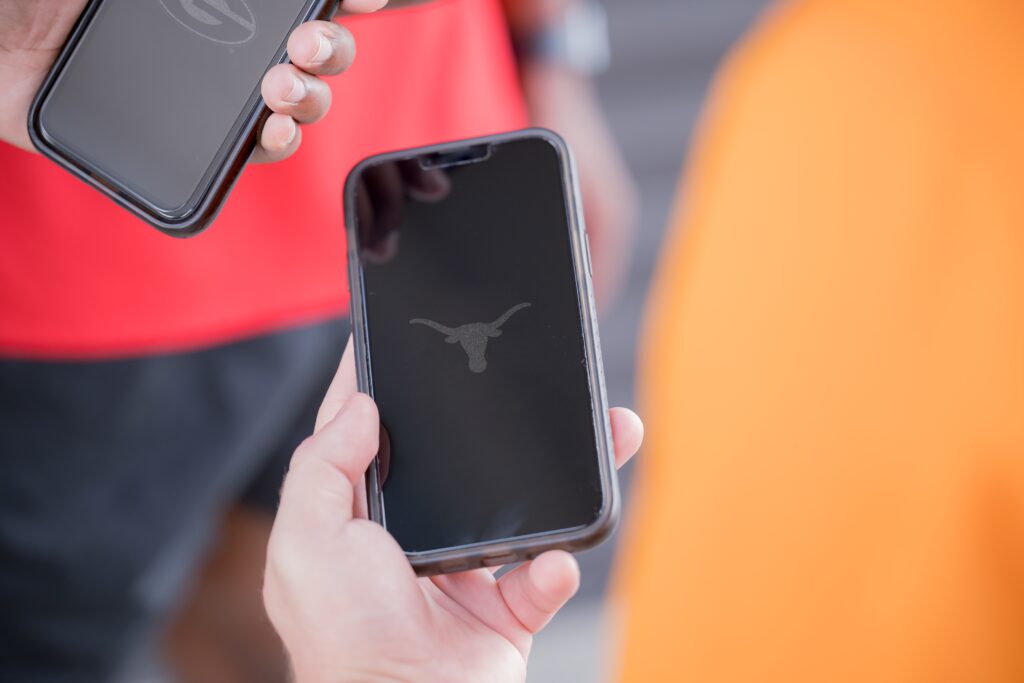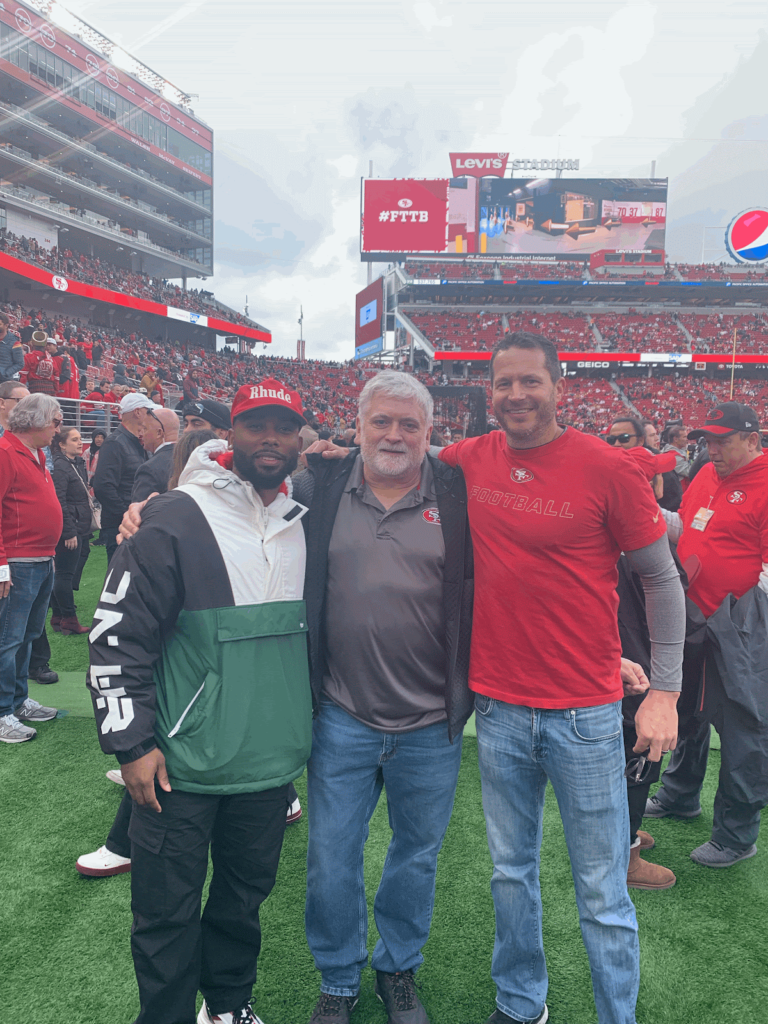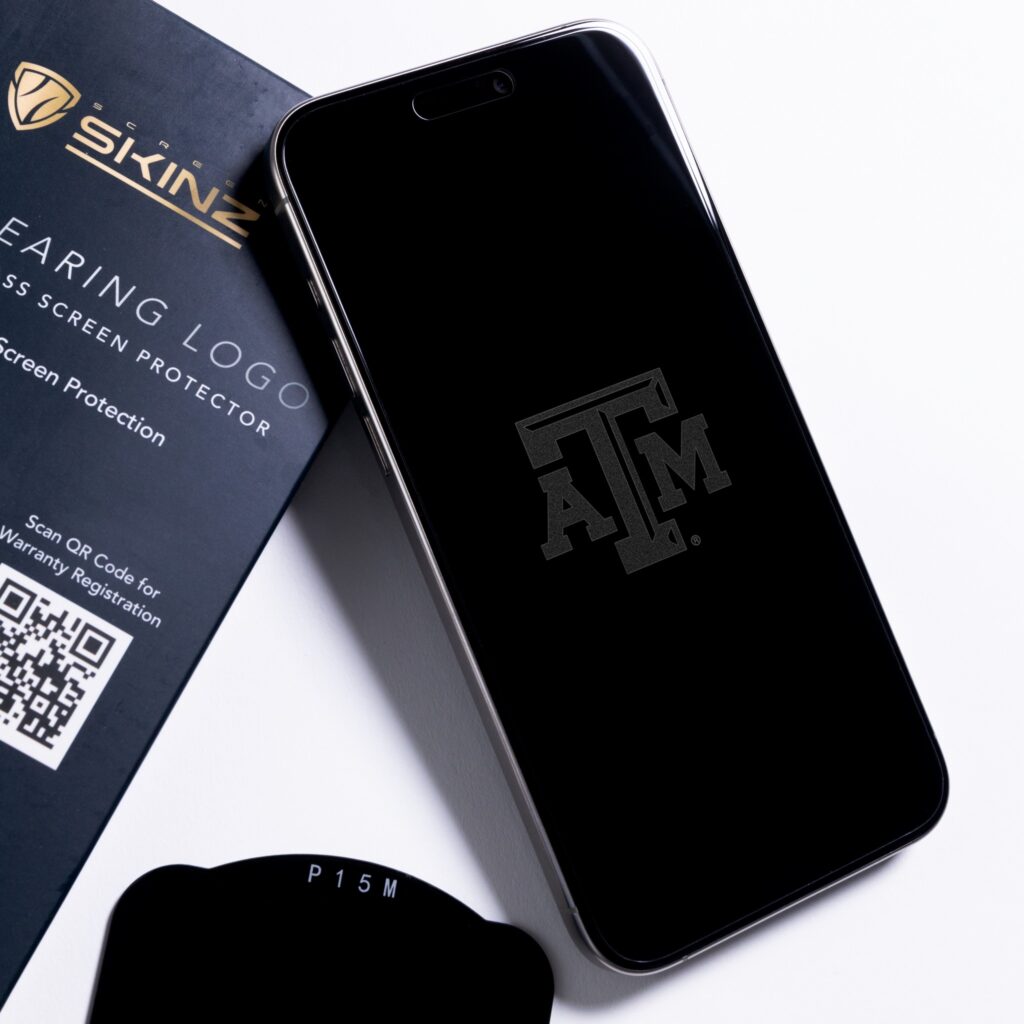Sports fandom comes in a lot of different ways.
You can wear your favorite player’s jersey.
You can watch games live with other fans at a local team bar.
You can even spend your weekly paycheck betting on your team to win (please don’t do this).
But now you can put your favorite team on your phone screen.
Introducing Screen Skinz.
Founded by RaShaun Brown and Clay Canning, the company is a manufacturer and licensee of officially licensed phone screen protectors.
Through partnerships like Keyscaper, the company produces screens officially licensed within leagues such as the NFL, NFLPA, MLB, NBA, WNBA, NHL, and NCAA Colleges.
They also plan to launch entertainment brands such as Star Wars and Marvel this summer.
With the global screen protector market reaching over $50 billion in 2023, the future is bright for this young startup.
In this interview with co-founder RaShaun Brown, we discuss how they got the licenses for the leagues, the process of getting a patent for their product, and some crucial lessons learned from entrepreneurship.
Hello, who are you and what is the name of your company?
My name is RaShaun Brown, and I am the co-founder and CEO of Screen Skinz.
We’re a screen protector manufacturing company that produces on-demand branded screen protector offerings with officially licensed and customized designs.
I started my career in sports after graduating from Ohio University’s esteemed Ohio Sports Administration program. While in graduate school I worked on a personal project that inspired my passion for licensing and how that fits within the fan’s experience.
My co-founder Clay Canning started selling screen protectors while in high school and repaired damaged phone screens as a side hustle.
He saw the opportunity to brand the screen protector in this unique way that adds sentimental value to a commoditized product.

What was the process of getting the company off the ground?
Clay and I met through my uncle, Maurice Clarett, while I was working for the 12th Man Foundation at Texas A&M during the pandemic.
He was living in Florida, so we built our business relationship via Zoom and many phone calls.
He had been working for years engineering different techniques to yield the perfect disappearing result in his mother’s laundry room. He says he should’ve been an engineer.
Ironically, the prototype was the Florida Gator logo because Clay is a huge Gator fan. I didn’t like that as much as I am an Ohio State and adopted Aggie fan.
We looked at companies that dominated mobile accessories like Zagg, Otterbox, and PopSockets, and companies selling other licensed mobile products on Fanatics.
They were crushing it with personalization, but no one was personalizing one of the highest volume and highest margin mobile accessory products, screen protectors.
We understood our PMF (product market fit), but we didn’t understand how to start and grow an actual business.
This is where the Aggie influence came in, as I leaned on many of my donors from Texas A&M who ran successful businesses or knew someone else in the Aggie network.
Crucial figures for us were Fadi Kalaouze and Shelly Brenckman, who coached me and introduced us to many of our eventual advisors and investors.
How did the partnerships with each league come about?
At our core, we are sports fanatics and we saw this as a simple product that other sports fans would want if their favorite team’s logo was on it. As entrepreneurs, we understood the market opportunity for screen protection and how licenses could grow that opportunity.
Obtaining sports licenses is very hard, especially with little cash and massive minimum guarantees. I leaned on my sports business connections and my instinct to hustle.
During the pandemic, I was fortunate enough to meet the EVP of Fanatics College Derek Eiler, and the SVP of the Collegiate Licensing Company David Kirkpatrick.
If it weren’t for connecting with those guys and them allowing me to pitch our product, we would not be where we are today as licensing has been essential to our foundation and early success.
For any founders looking to get into licensing, I would jokingly say “Don’t”!
They should understand the value of their product, and your customer, and have the correct infrastructure to support maximizing the licenses you’ll obtain.
How is the company doing today and what does the future look like?
Currently, we partner with Keyscaper and NBALAB to manufacture officially licensed screen protectors for the NFL, NFLPA, MLB, NBA, WNBA, NHL, NCAA Colleges, Star Wars (Lucas Films), and Marvel.
We also partner with Desert Cactus, a major collegiate license to manufacture our product across 300+ colleges, universities, and NPHC Greek letter organizations.
We have been able to operate very lean due to having partners with established infrastructures and we’ve built an advisory team of industry experts to help navigate how we run the business.
Our advisory board features prominent executives within consumer electronics, former Apple mobile accessory executives, former Hasbro and NFL consumer product executives, and former Nike executives.
We would be lost without them and I view them as a cheat code for us, especially at this stage.

Over the past 6 months, we have transitioned to on-demand manufacturing.
If you ask anyone in the licensed space, this is the way to go as you mitigate your inventory risk and maximize your licenses.
We are now able to operate from 12 total SKUS across clear and privacy.
We decreased our COGS by over 50% and in most cases we were able to produce any design within 30 seconds.
We have new products coming to market this month, including the option for customers to design their screen protector.
We are very excited about this, as we believe this will be how we establish our brand and technology in the market.
Long-term we will continue to innovate within the space, focusing on our technology, customer service, and the customer experience.
Over the next few months, we have some major partnerships and distribution channels we plan to launch. Keep a close eye out for those!
Through starting the business have you learned anything particularly helpful or advantageous?
I would recommend that every first-time founder join an accelerator program specific to their business or idea.
This is what I’ve found most helpful and impactful as you learn the basics of building a company while building with a community of like-minded individuals going through similar things.
You are also able to receive mentors and sponsors with domain expertise that can play pivotal roles in your growth and the business. We participated in DivInc and Founders Institute.
I can think of a few mistakes that we made in the beginning while trying to grow the company fast with limited resources, but they were also lessons.
The one that sticks out is how we almost sold the company within our first year, after being sold the dream. We spent almost a year trying to sort out this acquisition and the deal fell through at the last second.
Through that process, we learned so much and gained more confidence in what we were building.
You can not cheat the process when trying to build a company. You have to put the work in every day, even when you start to have self-doubt.
That’s what this journey will do to you. It’ll take you on an emotional rollercoaster. You have to have perseverance.
What was the process like getting the product patented?
Patents are a very tough process.
Almost as difficult, if not on the same level of licensing.
We are personalizing the glass on the top surface.
This is what enables us to support our business model at scale and mitigate our overhead.
It’s all about making the right claims to allow your patent while being as broad as possible.
We all know patents expire, so our strategy has been to build other motes around our main application to block potential competitors from replicating our process through manufacturing and technology trade secrets.
Are there any particular tools, software, or resources you use to be more productive?
Our main software is a custom software we built out called Albert, it’s what automates our manufacturing process from design to production.
Albert is my late grandfather’s name, which is also the name of the Florida Gator mascot and Clay’s first car.
When we named it, I wondered why Clay didn’t give a rebuttal.
We also use your typical software and subscriptions; Shopify, Netsuite, Slack, Monday, Canva, Mailchimp, etc. to help with productivity and communication.
What advice do you have for other founders trying to build a team and hire talent?
We lean on our advisors to guide us, teach us, navigate opportunities, and assist with needed hiring.
If we can do anything in-house that is our first option.
We have outsourced marketing and an Amazon reseller agency, Amify, with whom we share mutual investors.
I would say we operate more like a family.
Our culture is centered around trust, collaboration, communication, and transparency.
Are there any books, resources & podcasts you recommend for other founders?
I wish I could read fiction books to escape sometimes, but I read a lot of books that focus on personal growth, development, and faith.
I think it’s just the season that I’m in, I love finding little nuggets of wisdom that I can use in my day to day.
I would recommend the Bible (The Book of Matthew), Outwitting the Devil, Infinite Game, Grit, and Rich Dad Poor Dad.
I listen to podcasts now and then. I would recommend Consumer VC with Mike Gelb and Earn Your Leisure.
Are you currently hiring and if so, where can people apply and find out more?
We are currently not hiring, but I can see us hiring later this year with everything we have in our pipeline.
We are looking for some sports biz folks who would love to test our product for free and potentially become advocates.
If interested please reach out here.

